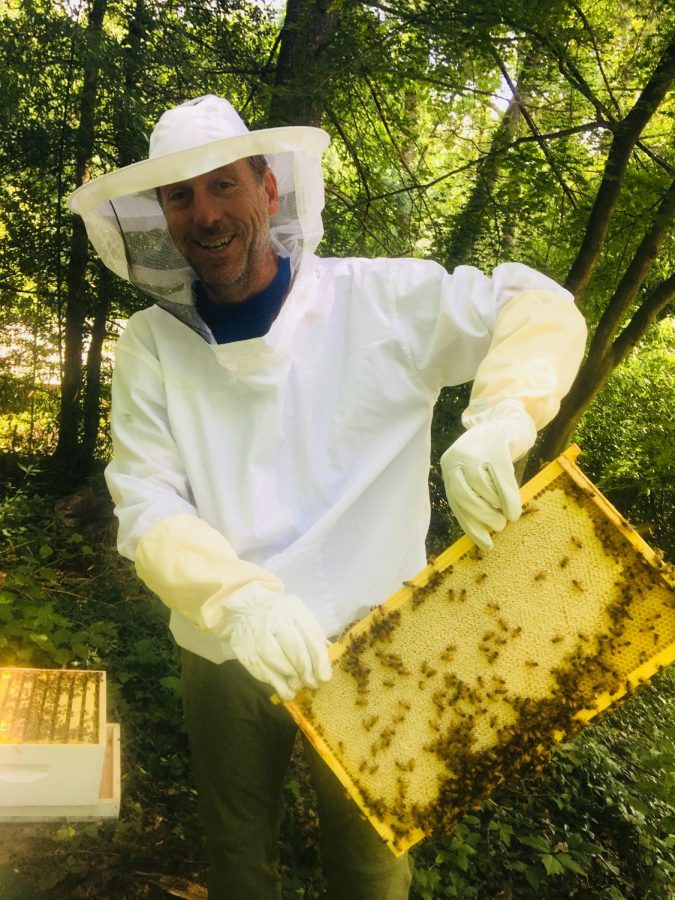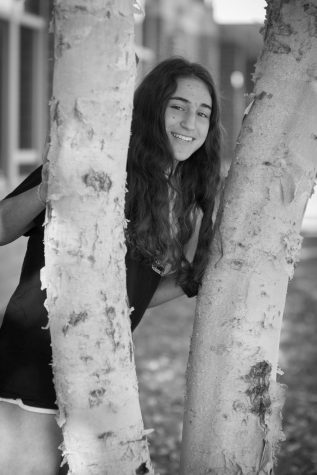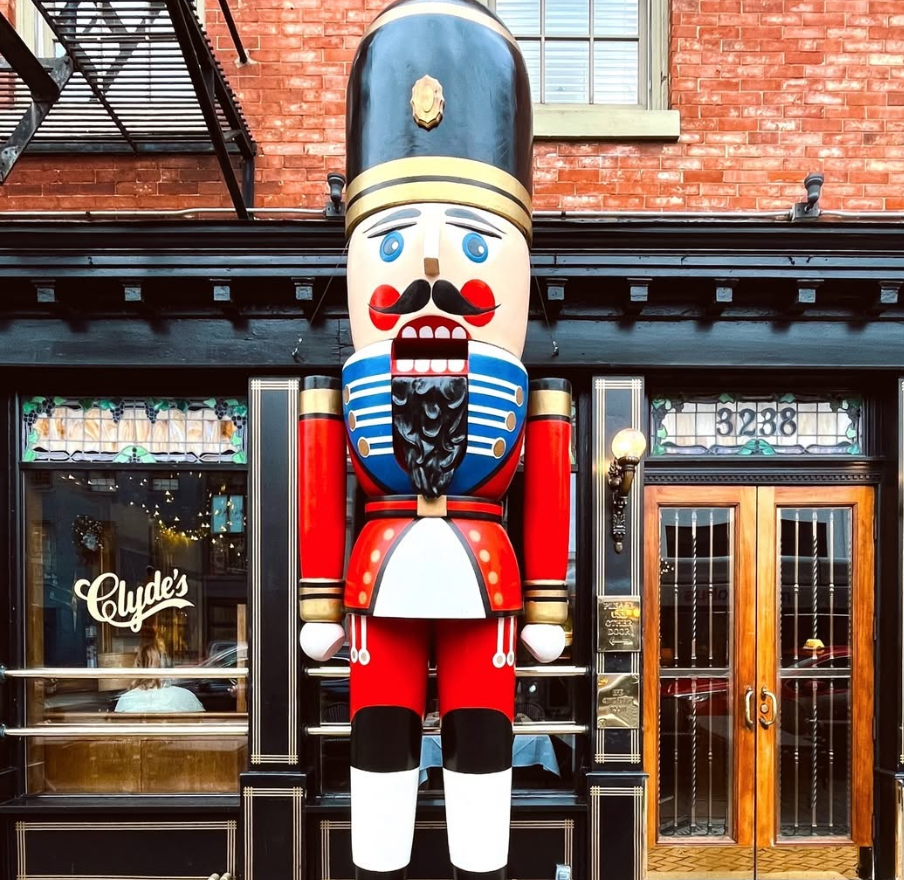The buzz on beekeeping
Whitman families take up a sweet hobby
Whitman parent Dan Stoner holds up a tray from his beehive. Each tray holds wax honeycomb that bees fill with honey each spring.
January 31, 2020
Whitman parent Chris White zips on his white, full-body bee suit and matching white gloves as he heads out to his backyard. There’s a low buzzing hum coming from his five hives, each with four wooden trays stacked vertically and teeming with tens of thousands of bees. He takes out his smoker, holds it around each hive to calm the bees and extracts each tray, looking to see if any are “capped,” or filled with honey.
Eight years ago, the White family started their own apiary, a collection of beehives, in their backyard. Now, they sell their honey products on their website Bee-America.com, in Mount Vernon, Virginia, and at craft shows. Another Whitman family, the Stoners, collect and sell their own honey as well, and for both, beekeeping is a way for the family to help the environment.
Through an article, Chris learned that bees were an endangered species in 2011. He remembers feeling like he should try to help the cause because he felt that beekeeping was a way he could make a “tangible benefit” in his community, he said.
“You look at the world and you think, ‘how can I make a difference?’” Chris said. “There are all these major things that you can’t do much about like global climate change or saving the whales, but individual urban beekeepers can really make a difference in terms of saving the bees and really improving your local ecosystem.”
Chris decided to start an apiary with his family — they had completed other family projects before, such as home gardens of flowers and vegetables — so he ordered queen bees for his hives from Georgia, the top state for queen production. The queens come shipped in wire screened boxes with an entourage of care-taker bees. Chris has to order new queen every few years because each queen only survives for two to three years.
“It freaks the mail carriers out, as the bees are right there buzzing quite loudly,” Chris said. “We always get a call from the post office begging us to come and get our bees as soon as possible from their facility.”
The Whites set up their apiary in the early spring of 2011, but it took until the following summer for the bees to fill the trays with honey because the bees needed a year to establish their hives and make enough honey to survive the winter. The first time the trays were full of honey, Chris remembers feeling elated.
“It was pretty magical to think that these insects that you keep in your yard produce something so wonderful,” Chris said.
Over the winter, the family tends to about 30,000 bees, but as it gets closer to May, the queens in each hive start increasing the size of their colony, bringing the apiary size to about 100,000.
On the few but stressful harvesting days, Chris and his family spend about 10 to 12 hours with the hives per day. They pull out each tray and remove the dead branches and extra wax until the honey is ready for bottling.
A year after they started keeping bees, the White family began to sell the honey. By selling their products, the hobby pays for itself, and they have the money to continue doing what they love, junior Zoe White, Chris’ daughter said.
Over the years, the Whites have bought more advanced equipment to handle their bees and package their honey. They use smokers to immerse the hives during the harvest, an automatic bottler to package the honey and huge vats in their basement for storing the honey.
As their sales and apiary have grown, so has their product line: Now, they sell seven different types of honey, lip balm and lotion — including tulip-poplar honey, made in part from local flowers. The most successful section of their business is dedicated to making honey taste like it did in colonial times by planting flowers and vegetation common to the 1700s agriculture, Chris said. The product names go along with the patriotic theme: among others, Liberty Honey, Pioneer Honey and Prairie Honey.
But the most important aspect of the business is that it’s family-operated, Chris said. Chris collects the honey, his kids help package it and his wife Tamara runs the website and newsletters.
“I remember painting the hive boxes,” Zoe said. “They used to be this ugly gray color, and my mom and I decided to paint them with patterns. That’s one of my favorite memories. It’s not just selling honey, it’s the fact that we did it as a family.”
The Stoners also beekeep as a family tradition. Senior Henry Stoner’s great-grandfather kept bees and passed it down through the generations. The extended Stoner family keeps their own apiaries across the east coast in Florida, North Carolina and Maryland, and they all share their pictures and experiences on their website, stonerhoney.com.
“My three boys have all been involved in taking care of the bees and harvesting the honey, so it has been a whole family activity,” Rosemary Trent, Henry’s mom, said. “It’s just been a great kind of unifying thing for brothers.”
The Stoners started beekeeping just two years ago but have already produced over 50 lbs of honey. Apart from the tradition, working with a female coffee-farming collective nonprofit inspired Rosemary to take on beekeeping. The collective’s self sufficiency and focus on farming as a main economic activity motivated Rosemary, she said.
“We love the idea of producing our own stuff,” Rosemary said. “We’re big composters and we had space in our yard and just wanted to give it a try.”
Each spring, the Stoners bottle up their honey and sell it to friends or neighbors or give it as gifts.
“It was amazing seeing how much honey they produced,” Henry said. “It was crazy. But it runs out pretty quick.”
Beekeeping has its challenges. Recently, there has been a national increase in hive mites and beetles, which are invasive species. It has become challenging for the Whites, along with other beekeepers, to keep their hives flourishing and to keep the queen alive. Once an entire colony fled because hornets had been attacking them, Zoe White said.
“It’s really hard over the years watching your hives get smaller and smaller,” Zoe said.
The problem has steadily decreased, Zoe said. As a solution, they put a cleaning device, the Swiffer Duster, into the hive. The bees chase the invasive beetles into the duster, Chris said.
Despite the difficulties, beekeeping has been rewarding for both families. To Henry, seeing the impact of his personal effort is his favorite aspect, while for Chris, educating others through his business is the most gratifying.
“The trees and the flowers are much happier to be in balance,” Chris said. “But helping educate people on how important these are to the natural ecosystem is the most rewarding part.”










